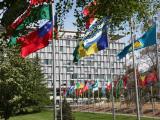(CIDRAP Source Weekly Briefing) – For some 2 million Americans registered with 260 embassies or consulates abroad, the US government says its Web site (www.pandemicflu.gov) is designed to provide the latest information on avian and pandemic influenza.
The site was referenced in the Dec 18 report "National Strategy for Pandemic Influenza Implementation Plan: Summary of Progress," which summarizes what federal agencies are doing to prepare for a pandemic.
According to the report, the US Department of State (DOS) and Department of Health and Human Services , with other agencies, were in charge of implementing programs to inform US citizens, including businesses, NGO personnel, Department of Defense Personnel, and military family members residing and traveling abroad, "where they may obtain accurate timely information, including risk level assessments, to enable them to make informed decisions and take appropriate personal measures."
William Armbruster, spokesman for the science bureau at the DOS, said that during meetings with ambassadors or visitors from other agencies over the past year, Americans living abroad have been encouraged to use the site.
Although the host government may give out information about the pandemic, he said, anyone overseas who doesn't read or speak the national language can use the site. Having one main source of authoritative information will prevent confusion and panic, he added.
And what will happen if the Internet is not working?
Armbruster said that while the power may go down in one part of a country, people living in another part can still access information. Additionally, each country has a "warden net," an embassy-controlled communication network designed to get information to Americans who have registered and are living in that country.
The system is tailored to each area and includes calling people, making announcements in the media, and in some cases, driving out to individual homes. Embassies may also call town hall meetings, assuming the government has not banned public gatherings
See the full list of pandemic planning actions at http://www.pandemicflu.gov/professional/federal/stratergyimplementationplan.html.
Comments from the Editor-in-Chief:
A significant number of the Americans living overseas are employees or family members of employees of international companies. Their need to have clear and predetermined plans and communication strategies for responding to changes in the pandemic threat was really brought home to me in late May. I was speaking at a meeting on pandemic influenza and business preparedness in New York City. A number of the Fortune 100 companies were represented at the meeting by their senior business continuity and security personnel. At that time the media was reporting on an emerging cluster of H5N1 cases among an extended family in Sumatra. It appeared at the time—and was later confirmed by the WHO—that 3 generations of person-to-person transmission of H5N1 virus had been documented. Rumors spread widely that the WHO was about to raise the pandemic alert level from Phase 3 to Phase 4. I asked for a show of hands how many of the companies had specific action steps in their pandemic response plans should the WHO elevate the status to Phase 4. To my surprise many companies did. I still have not figured out what the difference means from a pandemic risk perspective of such a change—and I don't think the WHO knows either. When I asked what the various companies would do, I was shocked to learn that many of them had plans to evacuate their ex-pats out of Asia (and only Asia) and bring them back to the US. It was evidentthat there was no clear understanding of what the possible change in pandemic phases really meant for the health and safety of their employees or their family member or even the reason for evacuating them from Asia. The takeaway message for me from this story is that having an effective way to communicate with employees based around the world is important. Knowing what to communicate is even more critical. We still have lots of work to do on that latter point.
—Michael Osterholm




















